17 Jan 2025
The third floor of the Engineering Building at Xi'an Jiaotong-Liverpool University holds a special space: an artfully designed community garden. Students voted to give it a romantic name: XJTLU Sunset Garden.
The garden recently earned awards at the national level in China. At the Fourth National Community Garden Design and Construction Competition, it received the 17th ranking overall among 161 teams from 43 cities. It also won first place in the Practical Teaching Award category from among 127 higher education institutions.
Furthermore, China Science Popularisation Network, a platform for public scientific education with audiences across China, has published XJTLU Sunset Garden’s introductory video. The Chinese Society of Landscape Architecture, a well-known national organisation, endorsed the video’s publishing.
Something for everyone
The story of the garden began in autumn 2021 as part of an assignment for the Skills for Planning and Design Practices module in the BEng Urban Planning and Design programme. Students repurposed industrial wooden pallets as planting boxes in their design for a mini mobile garden (“pop-up garden”). The pop-up garden was displayed across campus.
Over the past three years, constant efforts from students and teachers transformed what began as a mobile garden into the community garden of today, which contains features for fun, culture, sustainability education, art, relaxation, and more.
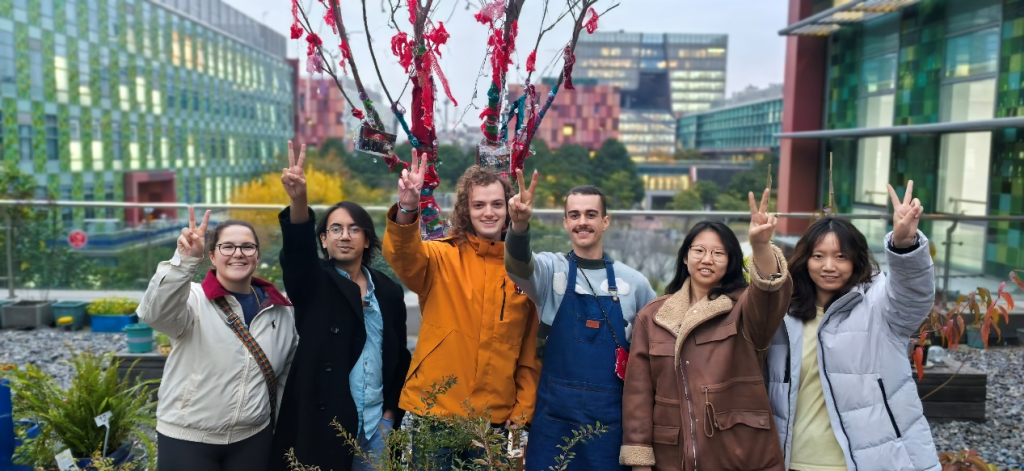
Students enjoy the garden together
For example, the Smiley Container Garden is an area of XJTLU Sunset Garden where every plant’s marker includes a student-drawn smiley face. The area includes repurposed old toilets, mop sinks and flowerpots painted in different colours, more than 10 kinds of plants with therapeutic effects, and wind chimes. Visiting this part of the garden offers opportunities to relax through scent, sight, touch, sound, and even taste.

Smiley Container Garden
Another XJTLU Sunset Garden standout is the Jiangcun Water Feature, co-created by teachers, students and residents of Jiangcun (Kaixiangong Village). The gentle flow of water provides a soothing auditory and visual therapeutic experience.
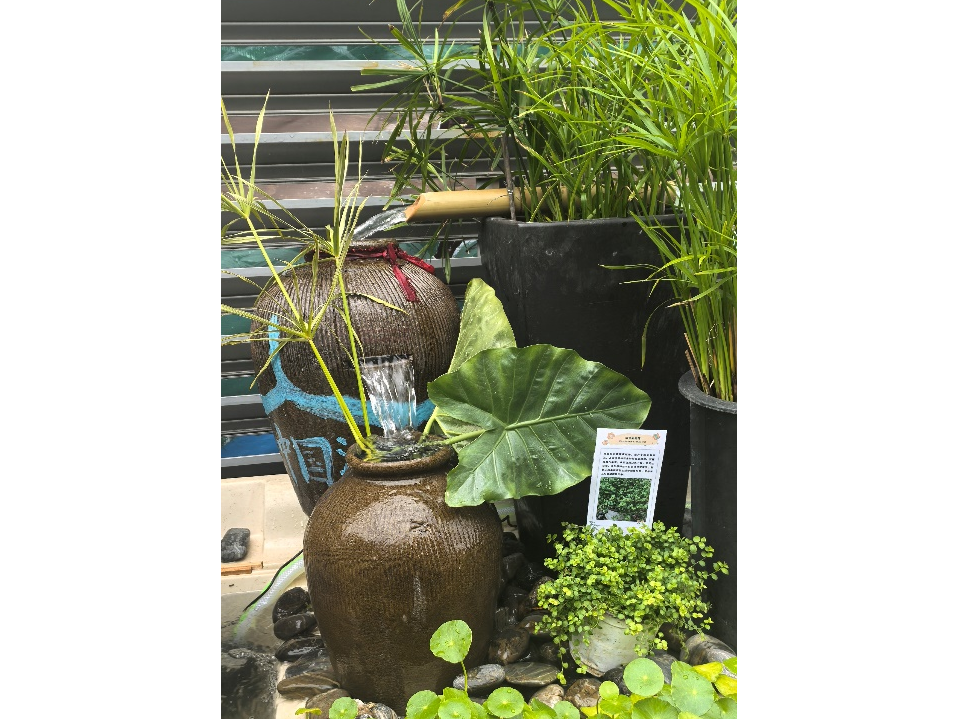
Jiangcun Water Fountain created together with the residents of Jiangcun (Kaixiangong Village)
Light-sensitive plants have a shaded zone, and recovering greenery go to a “plant ICU”.
A corner of the garden contains a solar-powered aquaponics device and a composting system that generates organic nutrient-rich soil and liquid fertiliser from campus kitchen waste.
There are also areas for small-class and hands-on activities, where discarded construction fences are reused to display posters and handouts, and bicycles discarded on campus have been repurposed into pop-up gardens.
In the large event area, a temporary gazebo can be set up with tables and chairs where people can teach, socialise, or enjoy a tea break.
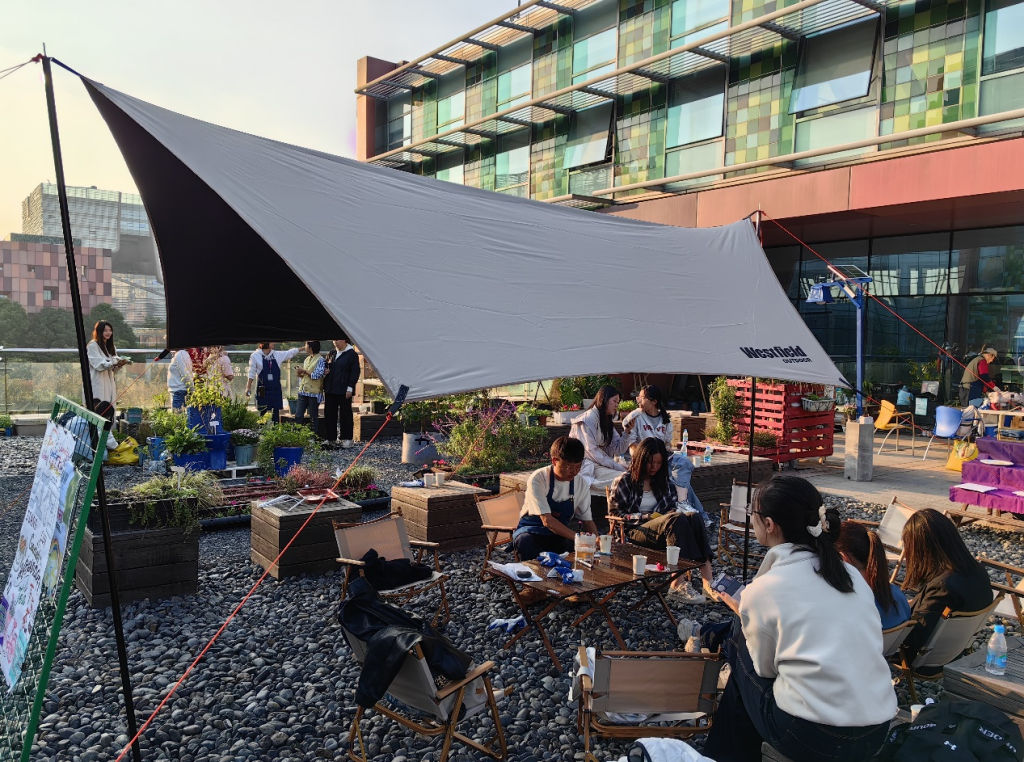
In the Sunset Appreciation Area, a visitor can become immersed in the afterglow of the setting sun and say farewell to the day as solar lights turn on.
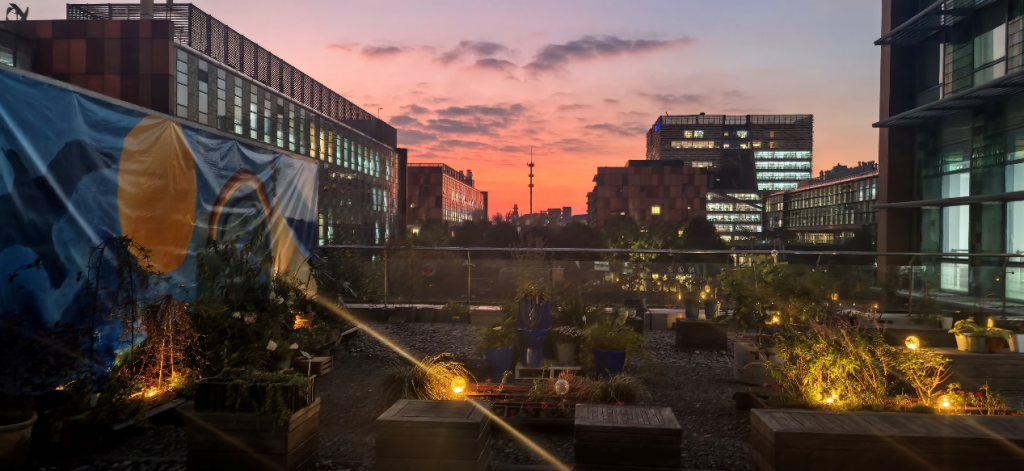
Sunset Appreciation Area
Sustainable ideas in practice
The garden provides examples of how sustainability can be implemented. The XJTLU Design School Community Garden Lab (XJTLU Community Garden Lab in short), which administers the garden, has added green innovations and examples of “zero waste”. These include a pop-up garden repurposed from discarded wooden pallets, the system for composting campus food waste, a solar lamp made from the Civil Engineering Lab waste, and plants watered with collected air-conditioning condensate.
These eco-friendly practices are supported by XJTLU’s Campus Management Office, the Design School Lab, and the Design School’s Academic Development Fund (AEF), and have become a part of green campus development.
Co-creation
Dr Chang says that the success of the XJTLU Community Garden practices comes from strong community engagement and interdisciplinary synergy.
“We actively organise open days, inviting residents of the surrounding communities, teachers, and students to participate, share their gardening knowledge and skills, and experience the fun that community gardens bring,” she says.
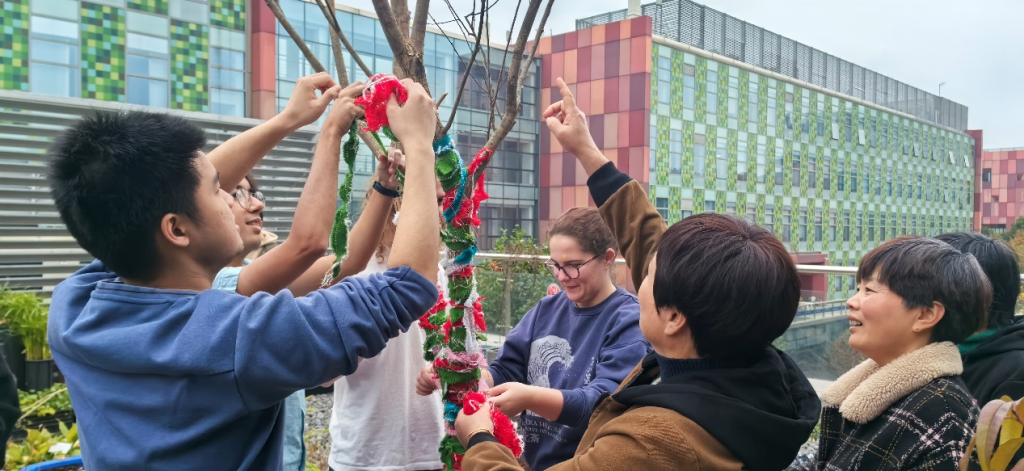
International students and Jiangcun (Kaixiangong Village) residents decorate the garden together in 2024
The lab also cooperates with professional organisations including a psychological clinic, an operation and management company, and an architecture and landscape design company. These organisations lend their expertise to integrate mental health, cultural and creative industry operation, and professional horticultural knowledge into the garden.
“This interdisciplinary approach of collaboration not only enhances the professionalism and sustainability of the garden, but also provides a broader platform for students to learn and practise,” Dr Chang says.
Contributing academically

The Wujiang Experiment of Community Garden, by Ying Chang, Bing Chen, Siyu Chen, Shanghai Science and Technology Press 2024
The practice and achievements of the lab have also been recognised by the academic community. The lab’s publications include a book, two journal papers, and two patents.
The lab has also completed an XJTLU key project and community garden project at the Luxiang Ercun neighbourhood in Wujiang District of Suzhou, in collaboration with Tongji University.
In addition, the lab also supervised a number of undergraduate and postgraduate dissertations on community garden and organised the Suzhou sub-forum and exhibition of the Third International Symposium on Community Gardens and Community Place Making, all of which contributed to the study of community gardens as an academic field.
Expanding and evolving
The XJTLU Community Garden’s growth has occurred through numerous events, collaborations, and initiatives, many of which have received recognition. These include:
- Between 2020 and 2023, the Lab team organised over 30 workshop activities, over 10 special training sessions, three community garden music festivals, and over 100 community services forlocal community. More than 300 families participated in the construction process and more than 100 volunteers contributed to the maintenance of the community gardens in Luxiang Ercun, Songling Street, and XJTLU, benefitting more than 2,000 residents and receiving extensive media coverage.
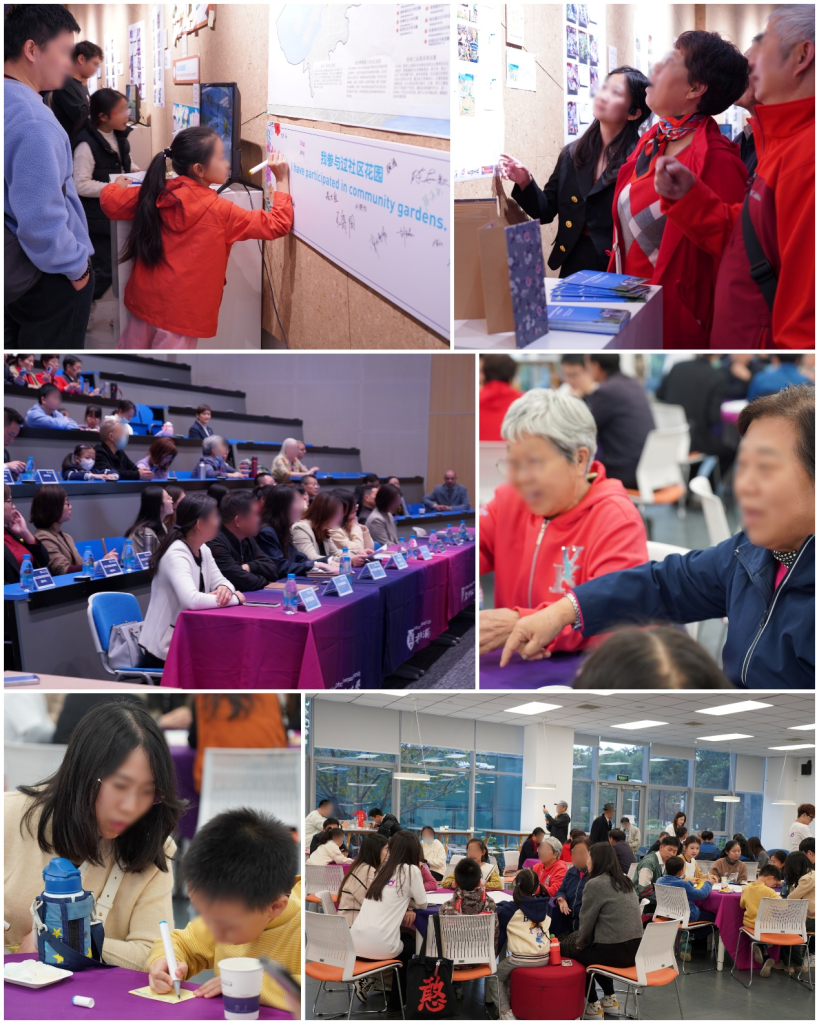
Volunteers from the community garden in Luxiang Ercun, Songling Street, Wujiang District, participating in the International Forum on Community Gardens in 2023
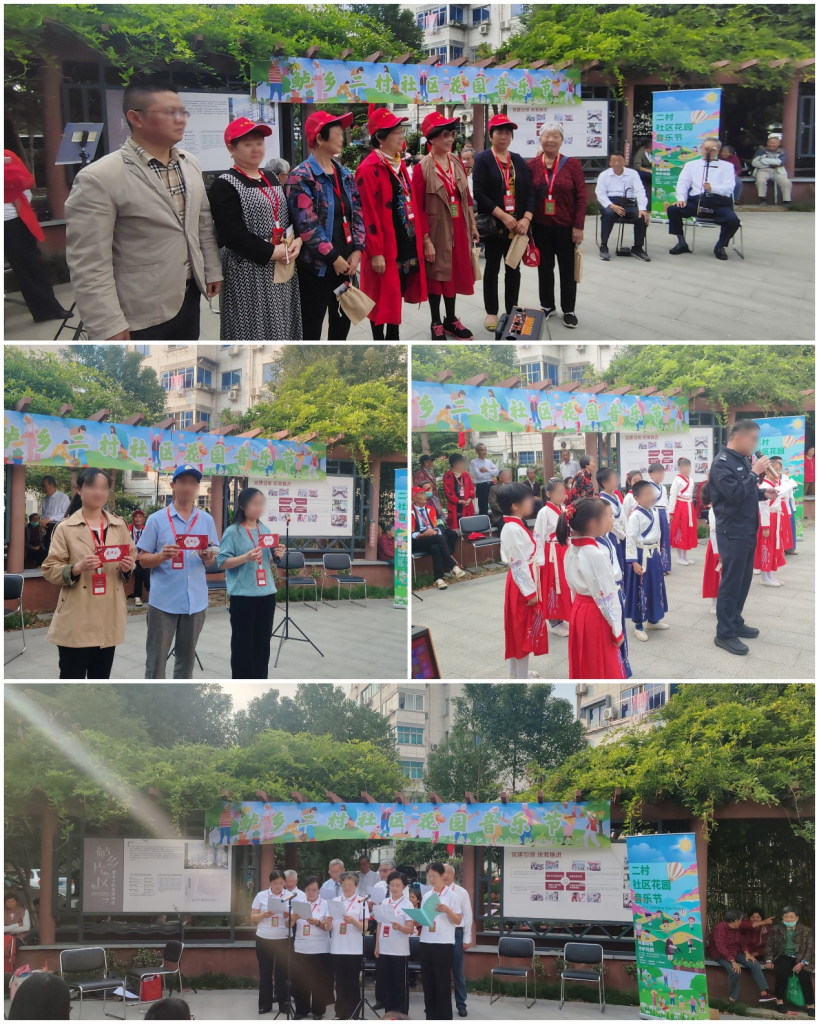
Community Garden Music Festival and Volunteer Recognition of Luxiang Ercun, Songling Street, Wujiang District in 2023
- In 2021, a team of students won second prize in the Student Project Achievement Competition of the Consortium of Interdisciplinary Social Innovation Courses in Colleges and Universities (CISICCU) for a design for a rainwater harvesting and utilisation device for community gardens.

2021 XJTLU team at the Student Project Achievement Competition of the Consortium of Interdisciplinary Social Innovation Programmes in Higher Education
- In2022, a student team participating in the Second National Community Garden Design Competition and Community Engagement under the “Zero Waste Garden” theme achieved an excellent result.
- In 2023, the garden’s lab held three open days, hosting more than 60 participants from Luxiang Experimental Primary School, Hanlin Primary School, Hanlin Garden Community, and Hyde Park Community. The lab also invited villagers from Jiangcunto incorporate rural elements into the garden to provide urban-rural interaction and integration.

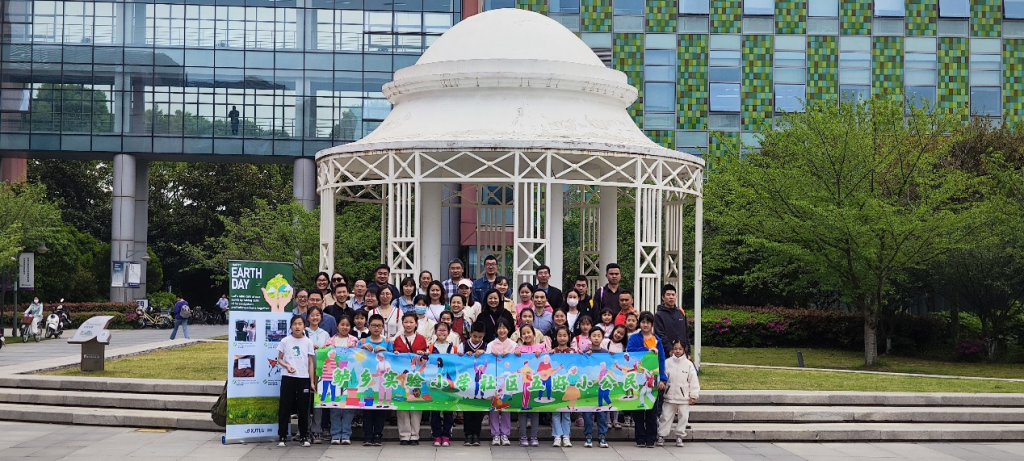
Luxiang Experimental Primary School participating in the XJTLU Community Garden World Earth Day in 2023
- In 2024, XJTLU Community Garden integrated the concept of sustainable development with physical and mental health under a “healing garden” theme. This focus is the result of a XJTLU Teaching Development Fund (TDF) study of online teaching and learning (TDF20/21‐R21‐136). Through interviews and focus groups, this research found deeper connections between people are in needed and that a community garden can foster social interactions and provide therapeutic effects.
Dr Ying Chang from the Department of Urban Planning and Design explains: “The garden integrates sustainability with mental health by blending thoughtful design, sensory engagement, and horticultural activities. Each zone repurposes materials and merges art with functionality, creating a holistic retreat from academic stress.”
- Also in 2024, a team of technicians from the Civil Engineering Laboratory received an award at the United Nations University’s Network of Experts of the Suzhou Regional Centre for Education for Sustainable Development (RCE Suzhou) 2024 International Zero Waste Day Environmental Creative Short Video Contest.
Dr Chang says: “XJTLU Community Garden not only provides a platform for XJTLU teachers and students to learn and practise, but also provides valuable experience and demonstration for the development of community gardens in Suzhou and even the whole country. We will continue leveraging green innovation to advance sustainable living environment.”
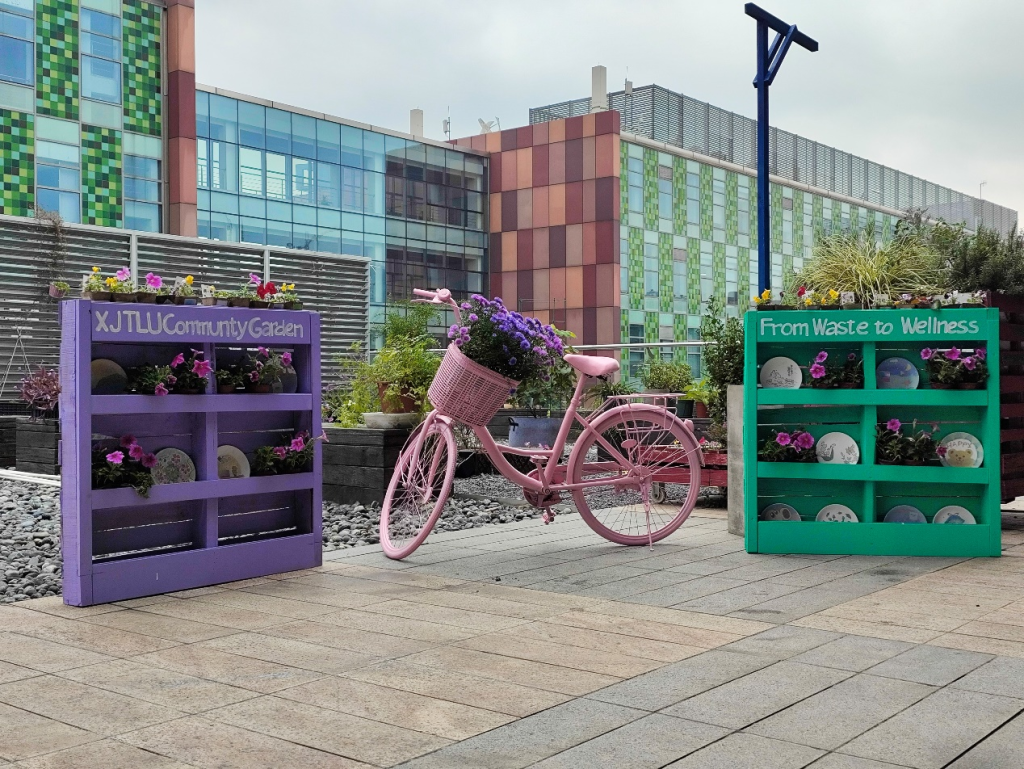
(供稿:常莹博士 编辑:寇博、钱懿)
17 Jan 2025








